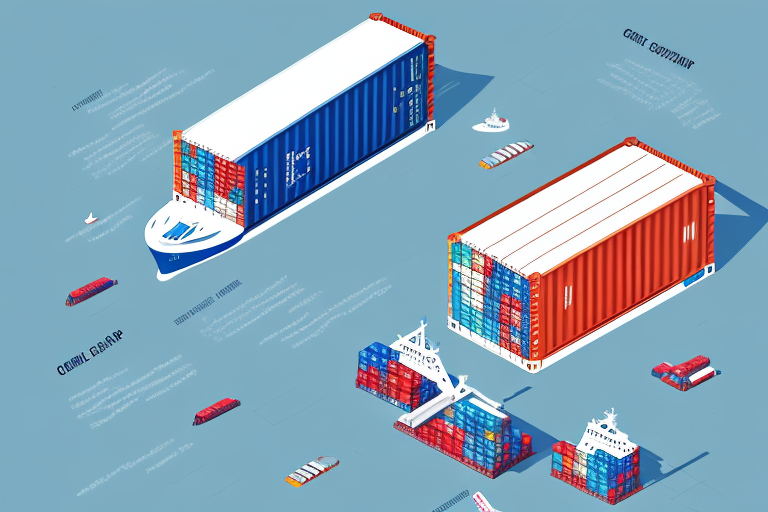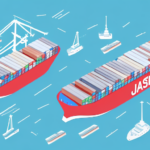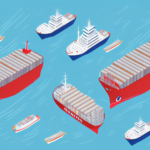Understanding Shipping and Logistics
Shipping and logistics are the backbone of the global economy, encompassing the movement, storage, and management of goods from producers to consumers. This intricate process ensures that products are delivered efficiently and reliably, whether domestically or internationally. According to a Statista report, the global logistics market was valued at over $8 trillion in 2023, highlighting its critical role in commerce.
The Evolution of Shipping and Logistics
The shipping industry has transformed dramatically over centuries, evolving from ancient sailing vessels to modern, technology-driven container ships. Innovations such as containerization revolutionized cargo transport by standardizing sizes and improving loading efficiency. Today, advancements like GPS tracking, automated warehouses, and blockchain technology continue to enhance the speed and transparency of logistics operations.
Types of Shipping Carriers
The shipping industry comprises various types of carriers, each specialized to handle different kinds of cargo and logistics needs. Understanding these types is essential for businesses to choose the most suitable carrier for their requirements.
Container Shipping Lines
Container shipping lines are the most prevalent carriers, transporting goods in standardized containers that facilitate easy transfer between ships, trucks, and trains. Their efficiency and reliability make them a preferred choice for businesses requiring large-scale transportation.
Bulk Carriers
Bulk carriers transport unpackaged goods such as coal, grain, and ore. These vessels are designed for the cost-effective transportation of large quantities of raw materials over long distances.
Tankers
Tankers are specialized ships designed to carry liquid cargoes, including crude oil, chemicals, and liquefied natural gas (LNG). They are crucial for the energy sector and other industries requiring liquid transportation.
RORO Carriers
Roll-On/Roll-Off (RORO) carriers are designed to transport wheeled cargo, such as cars, trucks, and heavy machinery. These vessels allow for easy loading and unloading without the need for cranes.
Parcel Carriers
Parcel carriers handle smaller shipments and individual packages, playing a vital role in the e-commerce sector by ensuring timely delivery to consumers.
The Critical Role of Carriers in Global Trade
Carriers are indispensable to international trade, acting as the conduits that move goods across borders. They ensure the seamless flow of products, contributing to economic growth and consumer satisfaction.
Supply Chain Integration
Carriers integrate various components of the supply chain, coordinating with suppliers, manufacturers, and retailers to optimize the movement of goods. Effective supply chain integration reduces delays and enhances the overall efficiency of operations.
Customs and Compliance
Carriers navigate complex customs regulations and compliance requirements, ensuring that shipments adhere to international laws and standards. This expertise minimizes the risk of delays and penalties.
Selecting the Right Shipping Carrier
Choosing the appropriate carrier is pivotal for businesses aiming to optimize their logistics operations. Several factors must be considered to ensure that the selected carrier aligns with the company's needs and objectives.
Cost Considerations
Shipping costs can significantly impact a company's bottom line. It's essential to evaluate carriers based on their pricing structures, including freight rates, surcharges, and any additional fees.
Service Quality and Reliability
Reliability is crucial in maintaining customer satisfaction. Assessing a carrier's track record for on-time deliveries, handling of goods, and customer service responsiveness is vital.
Transit Times and Geographic Coverage
Depending on the urgency and destinations of shipments, transit times and the carrier's geographic coverage can influence the choice. Carriers with extensive networks and faster transit options may offer a competitive edge.
Technology and Tracking Capabilities
Modern carriers leverage advanced technologies for real-time tracking, data analytics, and automated processes. These capabilities enhance visibility and control over shipments, allowing businesses to make informed decisions.
Environmental Impact
Sustainability is increasingly important in logistics. Evaluating a carrier's environmental policies, such as the use of eco-friendly fuels and emission reduction initiatives, aligns with corporate social responsibility goals.
Carrier Performance Metrics
Measuring and evaluating carrier performance ensures that logistics operations remain efficient and effective. Key performance metrics provide insights into a carrier's reliability and service quality.
On-Time Delivery Rate
The percentage of shipments delivered on schedule is a primary indicator of a carrier's reliability. High on-time delivery rates reflect efficient operations and dependable service.
Error Rate
Tracking errors in documentation, labeling, or handling indicates the carrier's attention to detail and operational accuracy. Lower error rates signify higher quality service.
Freight Damage Rate
The frequency of cargo damages during transit measures the carrier's handling practices and care for goods. Minimizing freight damage is essential for maintaining product integrity.
Claims Processing Time
The efficiency in addressing and resolving damage or loss claims reflects the carrier's customer service and accountability. Prompt claims processing enhances trust and satisfaction.
Customer Service Responsiveness
The ability of the carrier's customer service team to respond to inquiries and resolve issues swiftly is crucial for maintaining smooth operations and addressing any challenges that arise.
Carrier Liability and Insurance
Understanding carrier liability and insurance coverage is fundamental in mitigating risks associated with shipping. It ensures that businesses are protected against potential losses during transit.
Liability Limits
Carriers have specific liability limits based on the mode of transportation and the type of goods being shipped. It's essential to comprehend these limits to assess the level of protection provided.
Insurance Options
Shippers can opt for additional insurance to cover gaps in carrier liability. Comprehensive insurance policies offer extended protection against a broader range of risks, including natural disasters and theft.
Contracts and Agreements
Carefully reviewing shipping contracts and agreements helps clarify the responsibilities and liabilities of both the carrier and the shipper, ensuring transparency and accountability.
Future Trends in the Shipping Industry
The shipping industry is continuously evolving, driven by technological advancements, environmental considerations, and changing market dynamics. Staying abreast of these trends is crucial for businesses and carriers alike.
Sustainability and Green Shipping
With increasing environmental regulations and consumer demand for sustainable practices, carriers are adopting eco-friendly technologies. Innovations include the use of LNG, hybrid propulsion systems, and energy-efficient vessel designs.
Automation and Robotics
Automation in ports and warehouses streamlines operations, reduces labor costs, and minimizes human error. Robotics and automated systems enhance the speed and accuracy of cargo handling.
Blockchain Technology
Blockchain offers secure and transparent tracking of shipments, improving supply chain visibility and reducing the risk of fraud. Its implementation facilitates seamless information sharing among stakeholders.
Data Analytics and AI
Advanced data analytics and artificial intelligence enable predictive maintenance, optimized routing, and demand forecasting. These technologies enhance decision-making and operational efficiency.
E-commerce Growth
The exponential growth of e-commerce has increased the demand for parcel carriers and last-mile delivery services. Carriers are adapting by expanding their networks and investing in faster delivery solutions.
Enhancing Communication Between Shippers and Carriers
Effective communication is paramount in fostering strong partnerships between shippers and carriers. It ensures alignment of expectations, timely information exchange, and swift resolution of issues.
Real-Time Tracking and Updates
Providing real-time tracking data allows shippers to monitor their shipments' progress, anticipate delays, and make informed decisions. Transparency in communication builds trust and reliability.
Collaborative Platforms
Utilizing collaborative platforms and integrated software systems facilitates seamless information sharing and coordination between shippers and carriers, enhancing overall operational efficiency.
Regular Feedback and Reviews
Conducting regular performance reviews and soliciting feedback helps identify areas for improvement and strengthens the working relationship between shippers and carriers.
Optimizing Shipping Costs
Shipping costs are a significant component of a business's expenses. Optimizing these costs without compromising service quality is essential for maintaining competitiveness and profitability.
Consolidating Shipments
Combining smaller shipments into larger ones reduces the number of carriers required, lowering transportation costs and improving efficiency.
Negotiating Rates
Building strong relationships with carriers enables businesses to negotiate favorable rates and secure discounts, contributing to cost savings.
Efficient Packaging
Optimizing packaging sizes and materials minimizes waste and reduces shipping costs by maximizing container or vehicle space utilization.
Route Optimization
Utilizing software tools to plan the most efficient routes decreases transit times and fuel consumption, resulting in lower transportation expenses.
Best Practices for Effective Carrier Management
Implementing best practices in carrier management ensures that businesses maintain productive and reliable partnerships with their carriers.
Comprehensive Management Plans
Developing detailed carrier management plans outlines responsibilities, performance expectations, and key performance indicators (KPIs), providing a clear framework for collaboration.
Performance Tracking
Regularly monitoring carrier performance against established KPIs ensures continuous improvement and accountability, fostering high service standards.
Open Communication Channels
Maintaining open and transparent communication with carriers facilitates the swift resolution of issues and the sharing of vital information, enhancing operational efficiency.
Regulatory Compliance
Ensuring that carriers adhere to all relevant regulations and standards prevents legal issues and promotes safe and ethical shipping practices.
Continuous Evaluation and Improvement
Regularly assessing carrier relationships and seeking opportunities for improvement helps maintain optimal service levels and adapt to changing business needs.
Conclusion
Carriers are integral to the success of global trade, providing the essential services that move goods efficiently and reliably across the world. By understanding the different types of carriers, their roles, and the factors involved in selecting and managing them, businesses can optimize their shipping operations to achieve cost savings, enhance service quality, and ensure the timely delivery of their products. Embracing technological advancements and adhering to best practices in carrier management will further empower businesses to navigate the complexities of the shipping industry effectively.






















